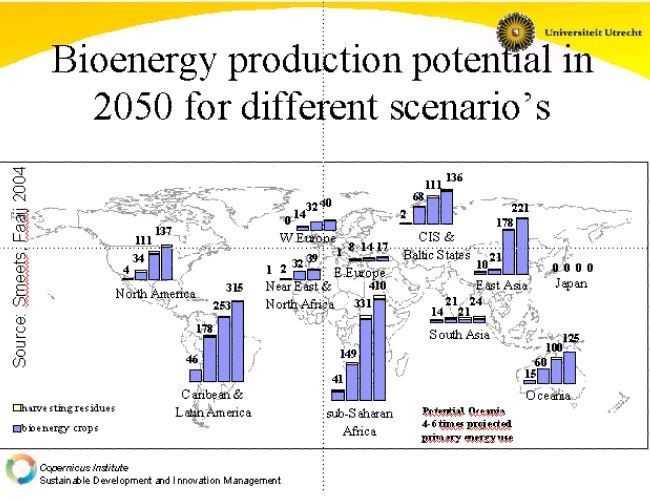This is exactly what the IEA Bioenergy Task Force 40 did. And it's interesting to see some basic results: http://www.bioenergytrade.org/
The principle scientist of Bioenergy Taskforce 40 has written several interesting studies about the global biomass potential under different scenario's, as they unfold in different regions.
Here's a basic map summarizing his research (numbers are exajoules) (the world's total current energy consumption -- that is ALL energy consumption, not just petroleum -- is 420 exajoules):

Please find the main study, here:
www.iea.org/textbase/work/2005/Biofuels ... tation.pdf
PPT presentation, here:
www.termo.hut.fi/Ene-39/006/part%20I.ppt [7.5mb]
The energy powerhouses of the future are green zones with high biomass indexes, no longer arid deserts where sheiqs waste water on their artificial golf courts). So the questions of the geopolitics of the future become:
-who controls the largest amounts of biomass?
-how will this control over biomass change geopolitical alliances? Is there a tropical, south-south alliance in the making?
-in what way does the nature of warfare (energy wars) change? (I imagine it's more difficult to occupy millions of hectares of energy crops than it is to occupy an oil pit and a pipeline - even though that already proves to be difficult).
-how about energy security and terrorism? It's probably fairly easy to create viruses and plant diseases and use them as strategic weapons to target the entire biomass base of a country. What about strategic biomass reserves?
-etc...
Also, as you can see from the map, vast geopolitical zones with high concentrations of people, have very limited potential: India, with it's 1.1 billion people; the US and the EU; even China doesn't have that much green stuff; Japan is in a totally disastrous state. It already knows this, that's why it is importing bioenergy in vast quantities from Brazil, laying the foundations for a long term strategic bioenergy partnership. (First sign of the Big Green Shift).
But then look at sub-Saharan Africa. It has tremendous potential and if things turn out right, the bioenergy future is THE single best opportunity for sub-Saharan Africa to trade itsself out of poverty.
The region's going to be the Green Opec.
In short, we're looking at a great transformation of the way our world works. And from what I read from the scenario's, I think I like it.



![new_popcornsmiley [smilie=new_popcornsmiley.gif]](https://peakoil.com/forums/images/smilies/new_popcornsmiley.gif)







